- Home
- Ian Wallace
Z-Sting Page 7
Z-Sting Read online
Page 7
Entering by a doorless portal to her left, quietly he held his corrected ID thirty-five centimeters in front of her eyes. She considered it icily without turning. She remarked: “I thought you’d win.”
“You have good judgment. And while I can’t now see them, I recall that you have also compelling eyes.”
She swallowed. Gazing steadfastly at the card, she murmured: “For an old guy, Hertz, you have young retinae.” She turned in her chair, studied his face, and blurted: “I’m off at 1500 hours.”
“Unhappily,” he returned, “I’m off immediately—on distant duty, that is. But I could be back within days. Are you sure this isn’t merely impulsive generosity to a senior citizen?”
She reappraised his eyes, shook her head just a trifle, and pronounced: “Phone 9402-8713-2964, extension 702. If I’m out, leave a message—it will be a private recording.”
“How old am I?”
“Seventy-five?”
She didn’t forget his assurance going away: “I’ll be back before I’m fifty.”
Returning to the Mazurka, Croyd found that efficient Marana had radioed Moonbase and cleared their target of opportunity.
Soon afterward they were accelerating for Neptune.
Impossible purpose: to penetrate Marta’s Nereid.
Accelerating through interplanetary space at a 500-G thrust (which felt to the seasoned crew like a lazy half-g because of the 1:1000 inertial shield), the Mazurka made for Neptune to check out the apparent source of the extraterrestrial disturbance which had shown up in the tempopattern of Chihattan.
When he had secured Moonbase clearance, Marana had registered a working hypothesis that the cause of this disturbance might be a perpetual molecular tidal wave in Neptune’s outer crust resulting from differential spin rates as between concentric shells of the ponderous planet. Moonbase had transmitted the hypothesis to Nereid along with the report of clearance. The plausible hypothesis was cover baloney. Although Mazurka was now classified as matter for Internal Security, neither the clearance nor the hypothesis got immediately to Ziska, and therefore not to Marta either.
They cut Mars orbit in four hours twenty-one minutes, and (with their accumulating velocity) Jupiter orbit in another twenty-seven minutes: that mighty sub-stellar satellite of Sol, sub-incandescent gaseous cloak sun-gleaming, was brilliantly visible a million miles off and going away fast. In still another five hours twelve minutes, braking all the way, having loftily ignored Saturn and Uranus, they nosed in on the hither side of Neptune just outside the orbit of hurrying little Nereid which momentarily was on farside but would not stay there long.
The date (Sol/Centauri Convention) was 21 May 2475, three days after Keri’s confrontation with her father; and the COMCORD imbalance against Senevendia was continuing to decimal upward.
Neptune had three satellites. Post-medieval telescopes, embarrassed by Erth’s atmosphere, by 1948 had found only one, Moon-sized: they had named him Triton. A year later, a second had turned up, far out, having a dinky two hundred mile diameter, and ungodly slow (three and a half years planetary revolution): absurdly they named her Nereid in the face of her lethargy.
The third, the deep innermost satellite, appeared in the course of robot planetary exploration in 2003. She was an irregular rock-jag having sixty-nine kilometers mean girdle thickness and nearly a hundred sixty kilometers of length, whizzing close around Neptune once in two hundred minutes. Almost instantly the cultured astronomers paid homage to the humanities by christening the spritely new inner satellite Nereid, while the old sedate ex-Nereid was rechristened Doris.
It was on swift small inward Nereid, and not on slow fat outward Doris, that Marta had established the seat of Mare Stellarum in 2431.
Croyd sat hunched on a bench near the airlock at ship’s maximum beam, a lock that opened on to what was hull-top relative to the orientation of ship’s artigrav. He was suited up, with an atmospheric generator that was good for thirty-six hours in space or in uptime. His concentration was deep; and they were letting him alone, although only Marana knew what he was doing, and Marana didn’t understand it.
After forty minutes of silence while the ship hovered motionless relative to Neptune’s orbital velocity and rotation, Croyd lifted his head. “I have Marta past-located,” he told them. “She cut our present position at 0307 hours 35 seconds on 18 January 2431, matching orbital velocity with Nereid only this far outside. It accords with prior information: she heroically insisted on pioneering the Nereid outpost all by herself. Quite a dame, Great-Granddaughter Marta! On Nereid’s previous pass, she wasn’t there, so presumably she had just got her capsule into orbit. I’ll check the next few times around—”
Three crewmen were befogged and Marana was enthralled as Croyd bent his head again. About a minute later he raised it “She cut us repeatedly at two-hundred-minute intervals, but very squarely at 0233 hours 28 seconds on 19 January 2431. This is the pass I want. Better move out about a thousand kilometers—I’d hate to be clipped.”
Marana Issued the order, then demanded: “She cut our present position? Our course, you mean?”
Croyd already had his helmet on, but the transmitter allowed talking. “Cut our position. Passed right through us.” He glanced around, smiling inside his fishbowl helmet: “Don’t call Damage Control, Marana—we weren’t here at the time.” He sobered: “I could swing the transfer at the spacetime intersect, but last time I did that I nearly got it, and this time I don’t have to. Marana, are your orders clear?”
“Yes, sir. I report to Nereid the loss of a superannuated fourth-class custodian, stores, who went outside with a line to check on a meteor hit, forgot to hook his line, lost his head, and jumped when another meteor hit. Then I send out two scouters to cruise in a fruitless search for the custodian. Meanwhile I move in toward Neptune on close accelerating orbit, and spend four hours in a criss-cross telemetric reconnaissance. I then report to Nereid that I have the flakes I need for the interference analysis, and I pick up my scouters and return to Erth to resume megalopolitan temposcansion.”
“On the nose,” said Croyd, on his feet. “Excuse me, I’m a bit eager. Did you complete the Chihattan scansion?”
“Yes, sir, while you were in Manhattan. Any special sequence for the other scansions?”
Croyd appreciated Marana’s dark skin. "If you had your druthers, what megalopolis would you do next?”
“Senevendia City. My home town. But that’s no megalopolis—only a thousand square miles, and no more than nine million population.”
“It is, however, a constellation capital, and it’s on our agenda, and I don’t have any rationale for a priority order after Chihattan. Get Senevendia City next, then, since it’s your preference, and proceed to the others in any convenient order. And don’t leave any center until you get all of it. And ignore any further extraterrestrial disturbances—this was the only one I really wanted: the point was to get me on to Nereid.”
“Any orders about the ivisiradio equipment on Moon?” That was the proper name for what Mare Stellarum labeled their hypertelecom.
“I checked that crew today by visicom before we left the vicinity. They are going great guns, are in daily touch with Rab, are shooting instant pictures of celestial interest points: two days ago they shot Vega, not where she was twenty-six years ago, but where she is now. Their dummy installation upstairs is getting sneak inspections daily, our crew keeps thinking up new bugs to confuse the Mare Stellarum inspectors—”
"Bugs?”
“The latest was a creative dilly: counterspin friction. Forget ’em, Marana: what could you do if something went wrong? Attack Moonbase?”
“Well—”
“I know, you’d like to. Well: if you do finish all the scannings without hearing from me, check the Moon installation and see what they know about me. If they know nothing, have them check with Rab. If Rab knows nothing, find an excuse to go back to Senevendia and kill time with shore leave for a maximum of thirty days—then pick up the Mo
on apparatus and crew and return to Rab. Got it?”
“Got it, sir.”
“And take some shore leave tonight in Senevendia City. Morale, you know.”
“Right, sir.”
“Sync cutichrons.”
“0216 hours 30 seconds. Beep.”
“Beep. Cheers, Commander Marana.”
“Cheers, Mr. Croyd.”
“Just call me Croyd, eh?”
“Thank you. Just call me Marana—or Dana.”
The hatch closed behind him: in soundless space, with his feet he heard it clang-to. Then Croyd, for the first time in a long life, stood on the exterior hull of a ship in deep space—stood alone there in total airless night, feet held to hull only by minimal artigrav, facing into the pale glare of Neptune and otherwise in darkness.
His isolated position was only a means to further ends; yet a means situation can have end value, for a while, by reason of its aesthetic depth. Croyd, honestly thrilled yet not exalted but rather minimized, chose to stand there for a long while, opaquing his helmet Neptune-side so that he could visually inhale undistracted the measureless depth of the black star-crystalled universe that he now dwelt naked in.
An almost irresistible impulse pervaded him: tear off the helmet! Stand naked, then! He repressed it: this was not deep ecstasy, it was natural desire, but Man could not fulfill it. Not yet! Some day . . .
He became aware of a puzzling impression that he stood partly upside-down on the bottom of the ship’s hull and partly right-side up on top. Soon he understood: the ship was motionless with respect to Neptune, the planet’s gravity tugged at him and was just barely overcome by the ship’s minimal artigrav: thus Neptune was both above and below him, “down” being most generally defined as “toward the major center of gravity.”
Cosmic desire grew potent. He would not be content to ride the tame mare Mazurka!
A gleam separated itself from the right side of the Neptune disc. He recognized that it was Nereid rushing toward him, pale-inwardly illumined by near Neptune and pale-outwardly by the Sol star more than four billion kilometers distant. Transiently he reflected that if space travel had been possible by fast express train at the twentieth-century close of the post-medieval era, by train it would have taken him nearly thirty million hours to get here from Erth—about four and a half millennia.
Sucking in breath, he launched himself free of Mazurka and accelerated with his minirepulsor suit-thrust ahead of the Nereid-juggernaut, propelling himself at a blood-draining 11-g acceleration. Nereid was overtaking him relentlessly; and his angular thrust was at first only ten percent efficient, with a ninety percent vector diverted to keeping him away from the down-dragging Neptune mass, seventeen times the mass of Erth (but only .29 times the mean density). This rabbit-running ahead of the satellite was an unnecessary gambit, since the Mazurka could have carried him into safe flanking velocity before he pushed off, and a mortally dangerous gambit; but he wanted to do this . . .
For a grueling eight minutes he jammed g's into his losing race ahead of Nereid, with his angular efficiency continually growing as his velocity increased—but not, it seemed, fast enough to avoid being crushed by the hurtling rock called Nereid. He felt like a man on a handcar in front of the fast mail. Nereid was close behind him now, and he had let himself be dragged fairly down into her orbit, but she seemed to be gaining on him more slowly; and after two more minutes of exhausting g’s, Croyd had attained to her orbital velocity of 59,520 kilometers per hour (well under escape velocity for Neptune) and floated in freefall a scant hundred kilometers ahead of her.
At that near distance, behind him she was a whole planet.
Having won his self-dare, Croyd cut acceleration and braked slightly, dropping to a new orbit of his own about seventy kilometers inside that of Nereid. In this new orbit—safely in the clear of any mass other than a chance meteor—he uptimed to 2059 hours on 19 January 2431.
He happened to have his back to Neptune as he did so, he was gazing into starred space. As he timed in, abruptly space was cut off by the seeming of a gigantic craggy-glowing iceberg dead ahead of him. Cutting thrust, he drifted in orbital freefall. It was Nereid, all right, a mere seventy-seven kilometers outside his personal orbit; he was radially between Nereid and Neptune: he had miscalculated his timing by perhaps thirty minutes—had he up-timed while still ahead of Nereid on the same orbit, she would have engulfed him.
Croyd drifted for minutes, collecting himself. This was the year 2431, before Nereid's establishment as Mare Stellarum headquarters. The irregular Jagged moon rock Nereid was just that, no more: barren, dead, pre-life, an airless moonshard.
He was swept by an irrelevant realization: now, In uptime space, he could swim naked!
Releasing the rekamatic fastening of his helmet, he flung the headpiece back on its hinge, deeply inhaling and exhaling the absolute void of uptime space. Deliberately then he unsuited. Clinging to the suit with his left hand as it orbited beside him in freefall, with the other hand he removed shoes and socks and stuffed them into the suit; and he caused his overalls and underwear to fall away, pushing them too inside. Spread-eagling like a space diver, spinning slowly, for many minutes he played raw Dedalus floating between Nereid and Neptune.
Then some mucous twitch made him sough slightly; and he remembered that even his much-expanded uptime potential left him only twenty-five minutes without breathing. He turned attention to his purpose, without forsaking his demi-divine nakedness. Opening the tool belt on his suit with his free hand, he produced a length of cord and lashed the suit to his back in two places, around his upper chest just under his arms, and around his midriff. Gingerly then he activated the suit-thrust at one-tenth g. Its twin steering nozzles were located in the middle of the suit’s back between his cords. All held fast as he began to move toward Nereid. He picked up acceleration until he had reached two g: Nereid overhung him, filled his sky, began to reveal crag highlights and cave shadows In the Neptune glow. (Light somehow persisted in uptime; and this, with an assumption of rekamatic wave latencies in galaxy-strutted space, squared with his developing i-ray hypothesis . . .)
Deflecting nozzles, he dodged around Nereid and moved in again on her other side after a swift hundred-mile circumvention of her forty-mile half-girth; and then he had put her bulk between himself and Neptune.
Cutting acceleration, he allowed the gravity of Neptune and Nereid to pull him gently down toward the rocks perforce he did this semi-backward feet-first, using a hand torch for light, spreading his legs and peering down between them to see where he might alight, (Gravity persisted in uptime; only, nothing but an invader from actuality could be affected by it.)
Partly by good luck, he settled on the loftiest crag that he had been able to see as he came down, and it had a fairly flat crest of some twenty meters diameter, Instantly he cut torch and jets and stood raw, a natural man in space, bare feet planted on barren rock, weight of suit scarcely noticeable on this tiny mass whose freefall orbit canceled the pull of Neptune.
So standing on a place where down was just perceptibly where his feet were, he scanned space, waiting for his eyes to adjust. He was neither cold nor warm: in uptime there is neither heat nor its absence. Presently after-images of torchlight subsided, and there was nightblack, and then starpoints one by one winked into being. He looked downward all around him from atop the crag: there was a halo of pallor around the edges of Nereid in one direction, total darkness in the other; and this meant that Nereid had passed around to the night side of Neptune, away from the sun.
Croyd was a man standing naked on the edge of the universe, looking outward.
On an impulse, he launched himself outward with a leg-thrusting leap. It was escape velocity for Nereid. He floated lazily outbound from everything.
A glimmer to his left caught his attention: it seemed to be nearby, and it was the wrong color for a star, Activating jets, he moved cautiously toward it. At about the same instant he felt a vague sense of debilitation, and he re
membered that he had not breathed during about half an hour. Cutting jets, he began to fumble with the knots that bound his suit to him—and then he had a better idea. Reaching behind him into the helmet hole, he unsnapped the fastenings of the air hose, brought hose end around to his mouth, activated the generator, and breathed with deep leisure through his mouth for several minutes—reflecting amusedly that he was altering uptime by putting live C02 into space here, and that the alteration could have no consequences whatsoever.
Refreshed and ready for another thirty minutes raw, again he moved through emptiness outward-laterally toward the light point. When it resolved itself into several points, he knew he had located his original uptime quarry. He hit it with his torch—nobody could notice. As he suspected, he was hovering a few hundred meters from a spacecraft that was little more than a cylinder with low-power maneuvering repulsors, released here by a mother craft and to be recovered by a mother craft: at the moment, the repulsors were dark and dead, the cylinder was in freefall orbit adjacent to Nereid, the light he’d seen emanated from a row of portholes along a flank.
Croyd sighed: to enter, he would have to wait until the airlock opened, and whip inside before it could close on him and kill him. It might be a long wait, which meant suiting up. The fingers of his left hand fumbled again with a knot—and then unexpectedly his floodlight revealed a hinge hatch hanging open from the belly of the cylinder.
He jetted toward the hatch and hovered just below it, using his torch to peer into the airlock. The inner hatch cover was closed. This meant that the occupant of the cylinder was now outside. On a sudden warning hunch, he jetted away from the hatch—and just in time, for the eternally destructive mass of the suited occupant whished past him into the hatch and clanged the cover shut.

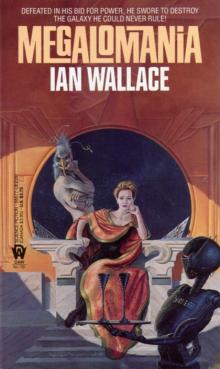 Megalomania
Megalomania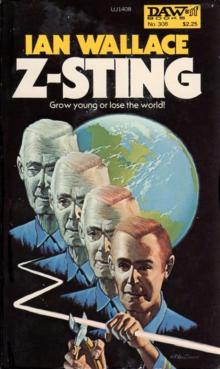 Z-Sting (2475 CE)
Z-Sting (2475 CE)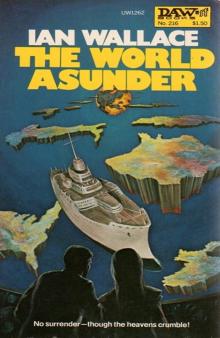 The World Asunder
The World Asunder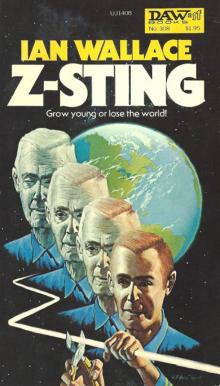 Z-Sting
Z-Sting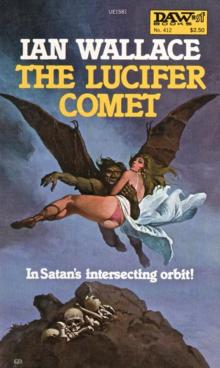 Lucifer Comet (2464 CE)
Lucifer Comet (2464 CE)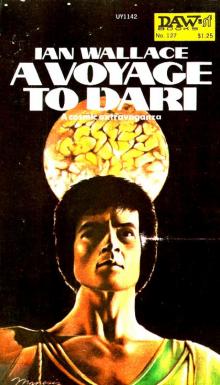 A Voyage To Dari
A Voyage To Dari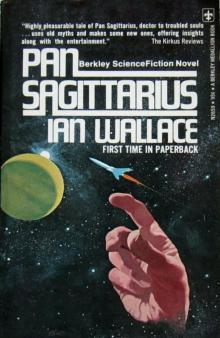 Pan Sagittarius (2509 CE)
Pan Sagittarius (2509 CE)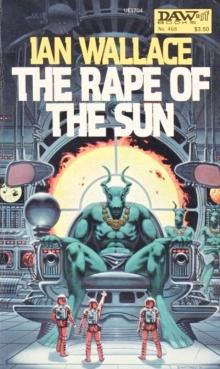 The Rape of The Sun
The Rape of The Sun